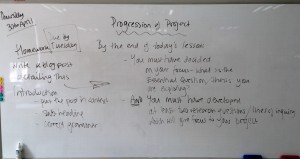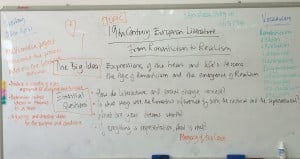[The following represents a re-work and expansion of a post already published on my other blog.]
OK, it’s time to stop testing the water with a toe and jump with both feet into project based learning.
Grade 10 have today made the leap with me. A leap of faith? I hope not. Let’s hope it’s more of a giant leap forward.
But enough with the metaphors. Just as I require Grade 10 to document the process, I will do the same. I have been exploring project based learning for a while and have put it into practise in a small way. Now is the time to see how it really works, whilst addressing required learning outcomes and assessing the students effectively in order to write their reports at the end of the semester.
Day One: Introduction of the Unit
I introduced the project to the class. We were due to do a unit on 19th Century European literature, and they have done a small amount of research in preparation. Today, we were going to start reading Goethe’s Faust. And then I stopped. Really? What can the students possibly gain from that? What’s more important is to grapple with the ideas contained within the text, rather than the text itself. What would you sell your soul for? How much are your dreams worth? Not wanting to waste the work already undertaken, and believing that the essence of the unit has value, I decided to change the way in which we worked, rather than change the unit completely and so I used elements of my previously written unit to introduce the project to the class under the following headings:
Topic:
19th Century European Literature: From Romanticism to Realism
Big Idea:
Expressions of the heart and life’s lessons: the age of Romanticism and the emergence of Realism
Essential Questions:
- How do literature and social change connect?
- In what ways were the Romantics influenced by both the natural and supernatural?
- What are your dreams worth?
- If everything is representation, what is real?
Learning Outcomes:
(these come from our curriculum)
- Produce a variety of texts appropriate for audience and purpose
- Determine central themes or ideas in a text
- Compare and contrast themes and ideas within and between texts
- Organise and develop ideas for the purpose and audience
Given the above prerequisites, the students need to produce a multi-media project, documenting their process and progress. They need to use 19th century literature as the vehicle to explore the ideas, so that the literature is secondary to the enduring understanding.
What I’m trying to impress on them is that they are not reading, for example, Faust or the poetry of Baudelaire or Wordsworth just for the sake of it, but as a means of exploring and understanding something more authentic and meaningful.
To ensure the project is still addressing the skills they need to be developing, they started with acquiring an understanding of some essential vocabulary:
- Romanticism
- Reason
- Revolution
- Idealised
- Nationalism
- Enlightenment
- Industrialisation
- Philosophy
- Neo-Classicism
- Realism
From there, they will start exploring some literature and decide what they wish to focus on and how they will present their findings. Despite several reminders that the ‘product’ comes last, of course that’s where they all start! “I’m going to do a video.” “I’m going to produce a rap song.” I have to say that I had to question where the latter fitted into the Romantic ideals, but if they can justify it they can do it!
It’s early days. They are currently engaged. Two of them are exploring a new ‘thing’ I found today: https://edu.hstry.com which looks promising.
Day Two: Providing Structure
As much as students enjoy project-based learning, I find that it’s important to give them some structure. Previous attempts at project-based units have lost momentum and meaning because of allowing the students too much free rein, and not giving them a framework within which to work. With each project-based unit, I am hoping that they will become more and more able to provide that framework for themselves, but at this stage there need to be stricter guidelines and deadlines in place to keep the students focused and productive.
Today was the follow-up lesson to the introduction of this unit on 19th Century European literature. Having given the students the opportunity for an initial surf of the internet and a read around of Romanticism in general and some authors in particular, I needed to get them to focus their thinking more keenly. Using Edmodo as our communication platform, I provided the students with some general links – mostly to Wikipedia as a first stop – and some statements that embody Romanticism – taken from ReadWriteThink – to ponder to help focus their thinking.
 From this, and the initial details given, the students needed to come up with their main area of focus for their project, develop two research questions, and initiate some specific lines of inquiry. They had to discuss these with me by the end of the lesson, and write a blog post giving more details about this as their assigned homework. As I had told them that this project will require work outside of class time, I feel that assigning homework tasks is within the spirit of the project and will be enhancing and developing their learning, rather than being ‘busy’ work or homework just for the sake of it – something I try to avoid.
From this, and the initial details given, the students needed to come up with their main area of focus for their project, develop two research questions, and initiate some specific lines of inquiry. They had to discuss these with me by the end of the lesson, and write a blog post giving more details about this as their assigned homework. As I had told them that this project will require work outside of class time, I feel that assigning homework tasks is within the spirit of the project and will be enhancing and developing their learning, rather than being ‘busy’ work or homework just for the sake of it – something I try to avoid.
I found this approach to be quite successful: by the end of the class most students and all the groups had a much clearer picture of where they are going with this project and had clear and focused lines of inquiry to follow.
Some of the topics are:
- How the philosophical and ethical thinking of the time is reflected in the literature
- How social change and Romanticism are connected
- How novels such as The Hunchback of Notre Dame and Phantom of the Opera provided impetus to the move from Romanticism to Realism
- How the “limitations” of Romanticism led to the emergence of Realism
- How the effects of Romanticism are felt in today’s world
Through the process of formulating and documenting their thinking, the students were able to determine in which direction their inquiries should go. For instance, in the first example above, the student will need to research what the philosophical and ethical thinking was and then find some examples in literature in which these are reflected.
I suspect as the students move forward, they will find they need to further hone and narrow their thinking in order to produce a demonstration of their understanding that is focused, detailed and specific. I continue to impress upon them a need for depth rather than breadth, otherwise the project becomes less meaningful in terms of enduring understandings.

